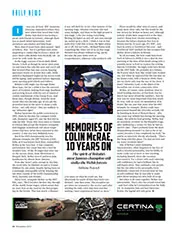
Memories of Colin McRae
The spirit of Britain’s most famous champion still stalks the Welsh forests It was one of those ‘JFK’ moments. Everyone remembers where they were when they heard that Colin McRae…
Lewis Hamilton took a record-breaking sixth victory on home soil at Silverstone, making him the most successful Formula 1 driver in the 79 years of the British Grand Prix.
His win – in front of a roaring home crowd – took him clear of Alain Prost and Jim Clark (five each) for the single most victories at the event, having already surpassed the total of Nigel Mansell (four).
Hamilton celebrated his record in now-trademark style by crowdsurfing over fans on the pit straight and posing for pictures long after the race.
The five-time world champion had started second on the grid, after qualifying six milliseconds behind team-mate Valtteri Bottas, but won after a show of dominance.
Hamilton benefited from a well-timed safety car to leapfrog Bottas and take the lead, but his win was always likely thanks to a one-stop strategy of his own making; one that he had kept from his engineers (and Bottas), who had considered anything less than a two-stop race unmanageable in terms of tyre wear. He went on to set the fastest lap of the race on 32-lap-old hard tyres ahead of Bottas, who had also been targeting the bonus point on much newer, softer tyres.
Hamilton’s win also makes him the joint most successful driver ever at their home event, with his 2019 victory moving him level with that of Prost, who had six wins in the French Grand Prix.
With 80 wins in F1 since his first at the 2007 Canadian Grand Prix, and seven so far this season, Hamilton is fast-approaching Michael Schumacher’s record of 91 F1 victories, which once looked impregnable.
That 91-win benchmark is no longer a faint dot on the horizon. It is now looming ever larger in the crosshairs of a man in imperious form.